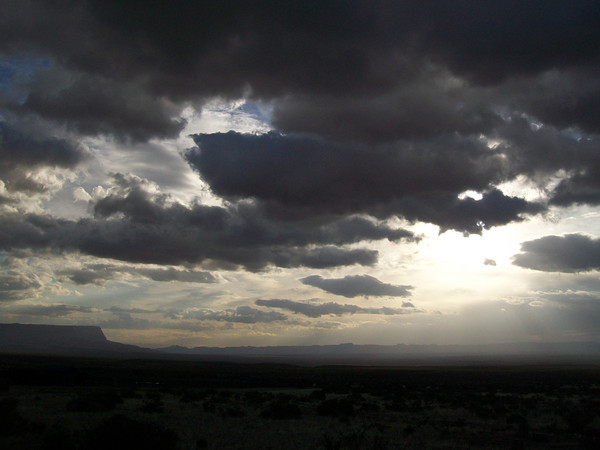“Who owns this land?” is often one of the first questions that flutters through my mind as I observe the breathtaking landscapes of this region. 55% of the Colorado Plateau are federal lands, while 24% of the land is designated to Native American reservations, 6% of it is state lands, and 15% is owned and operated by private investors. Additionally in this region there are 10 Bureau of Land Management districts, 15 National Forests, and 29 federal designations that display themselves as either recreation areas, National Parks, monuments, or historic sites (information provided by a pamphlet from the Grand Canyon Trust).
 The copious amount of natural treasures within the Colorado Plateau have resulted in a checkerboard display of ownership. Through immersing myself in the American philosophy of land management, I was extremely curious to learn about how other cultures such as the Hopi view the topic of land management in this region. Sitting in the car rolling over dusty roads we traveled from Page, Arizona to First Mesa which is a pocket within the Hopi Reservation in Arizona. Soon after we arrived we were welcomed by two Hopi women: Dorthy and Susan, a mother and daughter pair who care for a small farm tucked away on the Hopi reservation. They practice the ancient technique of dry farming with a variety of types of corn. In addition to growing corn they also care for a number of pear and apple trees. As we sat down and introduced ourselves they quickly shared with us the Hopi perpspective of land management. Within this culture there is no philosophy of ownership in regards to the land. Through the eyes of a Hopi, there is no single individual or agency who owns the land. Instead, each individual is seen as a steward. In other words, the land is collectively cared for by the community and anyone who may stumble upon it.
The copious amount of natural treasures within the Colorado Plateau have resulted in a checkerboard display of ownership. Through immersing myself in the American philosophy of land management, I was extremely curious to learn about how other cultures such as the Hopi view the topic of land management in this region. Sitting in the car rolling over dusty roads we traveled from Page, Arizona to First Mesa which is a pocket within the Hopi Reservation in Arizona. Soon after we arrived we were welcomed by two Hopi women: Dorthy and Susan, a mother and daughter pair who care for a small farm tucked away on the Hopi reservation. They practice the ancient technique of dry farming with a variety of types of corn. In addition to growing corn they also care for a number of pear and apple trees. As we sat down and introduced ourselves they quickly shared with us the Hopi perpspective of land management. Within this culture there is no philosophy of ownership in regards to the land. Through the eyes of a Hopi, there is no single individual or agency who owns the land. Instead, each individual is seen as a steward. In other words, the land is collectively cared for by the community and anyone who may stumble upon it.
I carefully listened to the words they uttered when discussing their relation to the land. It made me wonder about the terms that are often tossed around when discussing land in this region. In almost every discussion we have had on this trip whether the topic is politics or natural history, the term “management” wiggles itself into the conversation. Management. When uttered the very word comes out jangled and harsh as if it were a parasite. As I continue to ponder this word choice our nation has adopted to describe our land ethics, I can’t help but feel the words: control, dominate, and retain creep up and surround me and my thoughts.
From listening attentively to Dorothy and Susan’s word choice, there is no mention of the words “ownership,” “control,” “conquer,” or even “regulate” for that matter. Instead of these terms that reverberate the philosophy of a colonialist they use the words “patience,” “steward,” and “mindfulness” when describing their relationship to the land. In the Hopi culture there is no concept of what some may refer to as “bundled rights” in regards to natural resources. In this culture the people pay homage to the land and its countless treasures.
As these thoughts swirl through my head I can’t but extrapolate on the term “ownership” and the enormous weight it carries. This mindset of owning the land carries with it arguments, wars, and above all the ability to privatize. This way of thinking suggests as a culture we are more occupied with the logistics of conquering the land rather than relating to it on a deeper level, which in turn is really only reversing our original intent of managing and caring for the land.
Being a member of the public, a partial owner of the National Parks, National Forests, and some of the other treasures the Colorado Plateau offers, I propose as a culture we rethink the language we use in regards to managing the land. The vernacular we use in describing our relationship to the land manifests itself through us. This can be seen by the calm and tranquil presence that Dorothy and Susan embody. In contrast the BLM officers, National Park Service rangers, and other land management officials we have met convey a sense of frustration and rigidity.
As my thoughts flutter around me, I try to collect them. I pause for a few moments to marvel at the night sky. Larger than life, mysterious, and soothing are just a few of the words that come to my mind.